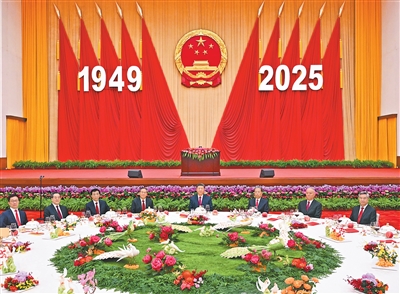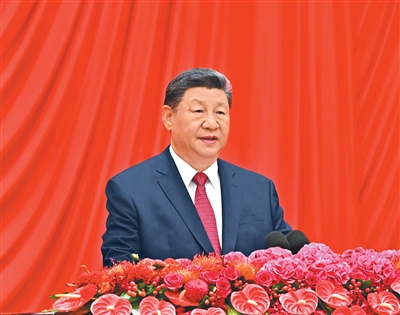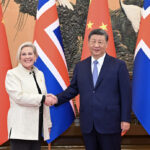|
On the evening of September 30, a reception celebrating the 76th anniversary of the founding of the People’s Republic of China was held at the Great Hall of the People in Beijing. |
 |
|
On the evening of September 30, a reception celebrating the 76th anniversary of the founding of the People’s Republic of China was held at the Great Hall of the People in Beijing. National leaders gathered with Chinese and foreign guests to celebrate the anniversary of the People’s Republic of China. |
A reception celebrating the 76th anniversary of the founding of the People’s Republic of China was held at the Great Hall of the People. The full text of the speech appears on page two. He emphasized that achieving the great rejuvenation of the Chinese nation is an unprecedented undertaking. Both aspirations and challenges inspire us to maintain a tireless spirit of struggle, seizing every moment without relaxation. We must unite more closely around the Party Central Committee, forge ahead with determination, work diligently, and strive to write a more splendid chapter in Chinese modernization.
The reception was presided over by other national leaders. Approximately 800 Chinese and foreign guests gathered to celebrate the anniversary of the People’s Republic of China.
The banquet hall of the Great Hall of the People was brilliantly lit, filled with a festive and warm atmosphere. The national emblem hung solemnly above the rostrum, with the dates “1949-2025” prominently displayed against bright red flags.
At around 5:30 PM, accompanied by the cheerful “Welcome March,” national leaders entered the banquet hall, waving to the attendees as warm applause filled the room.
The reception began with all attendees standing to sing the national anthem of the People’s Republic of China, the majestic “March of the Volunteers” echoing through the hall.
He delivered an important speech, first extending festive greetings on behalf of the Party Central Committee and the State Council to people of all ethnic groups across the nation, to officers and soldiers of the People’s Liberation Army and the Armed Police Force, to members of democratic parties and persons without party affiliation, sincere greetings to compatriots in the Hong Kong Special Administrative Region, the Macao Special Administrative Region, Taiwan compatriots, and overseas Chinese, and heartfelt thanks to friendly countries and international friends who have long cared for and supported China’s development.
He noted that over the past 76 years since the founding of New China, the Party has led the people in self-reliance and continuous struggle, achieving monumental accomplishments recorded in history. Looking back, the Chinese nation has moved from the brink of peril toward great rejuvenation—a journey marked by hardship and challenges, yet also filled with pride and triumphant progress. Recently, we solemnly commemorated the 80th anniversary of the victory of the Chinese People’s War of Resistance Against Japanese Aggression and the World Anti-Fascist War, greatly inspiring national spirit, patriotic fervor, and unity in striving. We must continue to draw on historical experience to build the country better and ensure the cause pioneered by older generation leaders and revolutionary martyrs continues to flourish.
He emphasized that this year, facing complex situations, we have further advanced comprehensive deepening of reforms, steadily promoted high-quality development, focused on ensuring and improving people’s livelihoods, and deepened the full and rigorous governance of the Party, achieving new progress and results in various endeavors of the Party and the state. Next month, our Party will convene the Fourth Plenary Session of the 20th Central Committee to study and formulate proposals for the 15th Five-Year Plan. We must closely focus on the Party’s central tasks in the new era and new journey, effectively plan and implement the goals, tasks, and strategic measures for the 15th Five-Year Plan development, ensuring decisive progress in basically realizing socialist modernization.
He stated that on the new journey, we must unwaveringly implement the “one country, two systems” policy, support Hong Kong and



